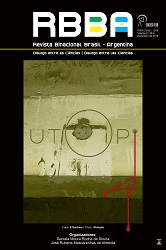1984: The dystopian future between us
DOI:
https://doi.org/10.22481/rbba.v8i2.6263Keywords:
Controle, Distopia, Manipulação, TotalitarismoAbstract
This article aims to present some reflexions from review of the book 1984, by George Orwell, in order to compare the romance to the current brazilian society, as well as to comprehend the several subjects in contemporaneity and their relations via media and social networks in that globalization context. Therefore, this study is anchored in philosophical, literary and social theories, from the perspective of theorists like Arendt (2012), Bauman (2001), Foucault (2009), Sousa Santos (2005), among others. The adopted methodology is guided in a qualitative approach, of bibliographic nature in a comparative, interpretative and reflexive process. It turns out that the book presents timeless traits to the socio-historical context in which it was produced and adjusts itself as an alert for the capitalist societies. The plot permeates by several aspects, which interconnects political, economical and tecnological facts, bringing in its approach, a possible future in which the majority of the individuals will have to give up their freedom, in detriment of a totalitarian regime. Finally, it is concluded that Orwell, in 1984, made a great contribution in predicting, through his romance, a society ruled by the power of a hegemonic minority that explores the most diverse social layers, in a hierarchical and politically situated way, not unlike the dark reality of this country called Brazil.
Key words: Control. Dystopia. Manipulation. Totalitarianism.
Downloads
References
ARENDT, H. Origens do totalitarismo. São Paulo: Companhia das Letras, 2012.
BAUMAN, Z. Modernidade líquida. Tradução de Plínio Dentzien. Rio de Janeiro: Jorge Zahar, 2001.
BAUMAN, Z.; DONSKIS, L. Cegueira moral: a perda da sensibilidade na modernidade líquida. Tradução de Carlos Alberto Medeiros. Rio de Janeiro: Editora Zahar, 2014.
BRASIL, M.S. Utopia e o século XXI: novas controvérsias. In: XIV Congresso Brasileiro de Sociologia, CT-UFRJ. Consensos e controvérsias da Sociologia. Rio de Janeiro, julho, 2009.
BUCCI, E. Quanto vale a sua privacidade? Revista Nova Escola, São Paulo, abr. 2002. Seção De olho na televisão.
CARDOSO, G.; et al. As fake news e a sociedade pós-verdade: uma contextualização conceptual. As fake News numa sociedade pós-verdade: contextualização, potenciais soluções e análise. Observatório da Comunicação (Obercom): Lisboa, Portugal, jun. 2018. Disponível em: https://obercom.pt/wp-content/uploads/2018/06/2018-Relatorios-Obercom-Fake-News.pdf.Acesso em: 10 fev. 2020.
CHARAUDEAU, P. Discurso das mídias. São Paulo: Contexto, 2007.
FACINI, A. Literatura e sociedade. Rio de Janeiro: Jorge Zahar Editores, 2004.
FOUCAULT, M. Vigiar e punir: nascimento da prisão. Tradução de Raquel Ramalhete. 27. ed. Rio de Janeiro: Vozes, 1987.
FOUCAULT, M. Os intelectuais e o poder – conversa entre Michel Foucault e Gilles Deleuze. In: ______. Microfísica do poder. Rio de Janeiro: Graal, 2000, p. 01-47
FOUCAULT, M. O dispositivo de sexualidade. In: ______. A história da sexualidade I: a vontade de saber. Rio de Janeiro: Graal, 2009. p. 73-125.
GIL, A. C. Como elaborar projetos de pesquisa. 3. ed. São Paulo: Editora Atlas, 2002.
HALL, S. A Identidade cultural na pós-modernidade. Tradução de Tomaz Tadeu da Silva e Guacira Lopes Louro. São Paulo: Lamparina Editora, 2014.
HILÁRIO, L. C. Teoria crítica e literatura: a distopia como ferramenta de análise radical da modernidade. Anuário de Literatura da Universidade Federal de Santa Catarina, Florianópolis, v.18, n. 2, p. 201-215, 2013.
JACOBY, R. Imagem imperfeita: pensamento utópico para uma época antiutópica. Tradução de Carolina de Melo Bomfim Araújo. Rio de Janeiro: Civilização Brasileira, 2007.MORUS, T. A Utopia ou o tratado da melhor forma de governo. Tradução de Paulo Neves. Porto Alegre: LP&M, 1997.
ORWELL, G. 1984.Tradução de Alexandre Hubner e Heloísa Jahn. São Paulo: Companhia das Letras, 2009.
RAMONET, I. Propagandas silenciosas: massas, televisão, cinema. Rio de Janeiro: Vozes, 2002.
SOUSA SANTOS, Boaventura. Fórum Social Mundial: manual de uso. São Paulo: Cortez, 2005.






